Your expertise in intellectual property law is valuable, but without visibility, it often goes unnoticed. In today’s digital-first world, being great at what you do isn’t enough. Potential clients need to find you first.
Nearly 92% of people looking for legal help start with Google—and most won’t look beyond the first few results. That means if your firm isn’t showing up prominently online, you’re likely missing out on high-value opportunities.
Whether it’s startups looking to protect a new invention or creatives navigating copyright concerns, today’s clients want fast, reliable answers. They’re turning to digital platforms for guidance—and often making hiring decisions before ever picking up the phone.
This article explores eight practical digital marketing strategies tailored specifically for intellectual property lawyers. It’s time to secure your online presence with the same precision you use to protect your clients’ ideas.

Why Digital Marketing Matters for IP Lawyers in 2025
Picture this: A fast-growing tech startup with valuable IP starts searching online for “best patent attorney in [your city].”
But your firm doesn’t show up — your competitor does. And just like that, you’ve lost a high-potential, long-term client before you even had a chance to connect.
What Makes Digital IP Law Especially Challenging to Master
Intellectual property law sits at the intersection of law, technology, and creativity, making it both specialized and highly competitive online:
- Your clients are often tech-savvy innovators who conduct extensive research before reaching out
- IP protection concerns span across industries (tech, entertainment, manufacturing, pharmaceuticals)
- The technical complexity of IP law requires clear, authoritative content that builds trust
- Clients need to feel confident in your expertise before entrusting valuable intellectual assets
The Numbers Don’t Lie
- 86% of potential clients research multiple firms before contacting any
- 75% never look beyond the first page of search engine results
- 63% of IP-related searches happen on mobile devices
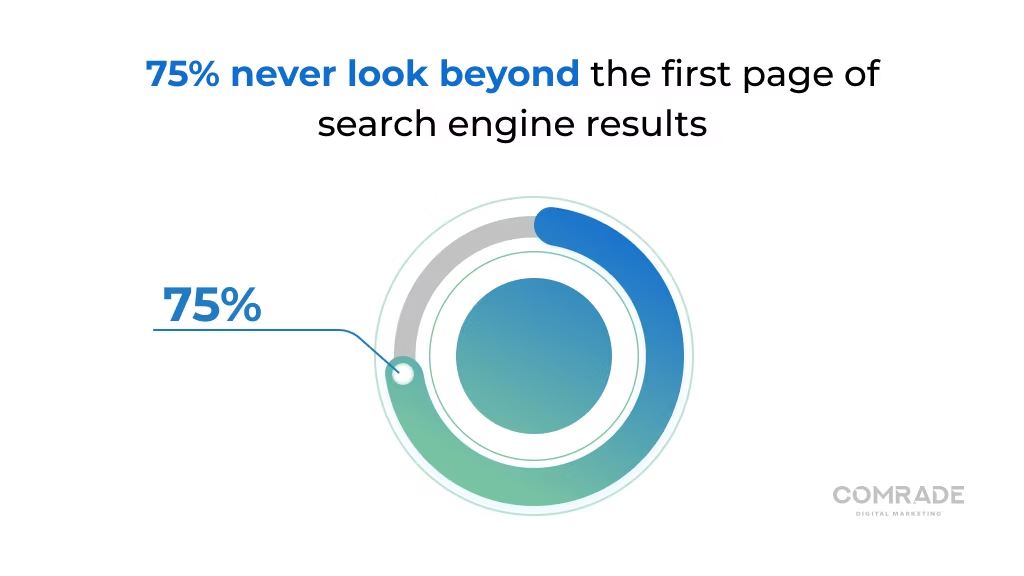
Without a strategic digital marketing approach, your IP practice becomes effectively invisible to the very clients who need your expertise the most.
It’s Not Just About Rankings — It’s About Becoming the Authority
Effective digital marketing for IP lawyers isn’t just about being seen — it’s about being remembered. By showcasing your expertise in patents, trademarks, copyright, and trade secrets, you don’t just attract attention — you earn trust. It turns your insights into influence, educates potential clients on why IP protection matters, and positions you as the authority they turn to first. The result? A steady stream of qualified prospects and a standout reputation in a crowded field.
How AI Has Turned Things Upside Down
Search isn’t what it used to be. Google SGE, Bing AI, and other platforms now provide instant, AI-generated answers — often bypassing traditional websites entirely.
For successful IP attorneys, this shift means:
- Your content must be structured to be “AI-friendly”
- Clear, authoritative answers to specific questions are essential
- Technical legal concepts need to be explained in accessible language
- Demonstrating real expertise matters more than keyword optimization
Let’s explore the eight essential strategies that will help your IP law firm thrive in this new digital landscape.
How To Get More Leads For Intellectual Property Lawyers?
1. Craft a Comprehensive Digital Marketing Strategy
Before launching any digital marketing initiatives, you need a clear roadmap tailored specifically to your intellectual property practice. A strategic approach isn’t just about improving visibility — it’s about attracting the right innovators, businesses, and entrepreneurs who need specialized intellectual property legal services.
Define Your IP Niche and Ideal Client Profile
Intellectual property law covers vast territory. The more specific you can be about your expertise, the more effective your online marketing will be:
- Do you specialize in software patents, pharmaceutical IP, entertainment copyright, or trademark enforcement?
- Are your ideal clients startups, established corporations, individual inventors, or creative professionals?
- What industries do you serve best (tech, entertainment, manufacturing, healthcare)?
Clearly defining these parameters will guide every aspect of your strategy, from content creation to keyword targeting.
Set Measurable Goals and KPIs
Define clear metrics aligned with your website goals to track success, including:
- Consultation requests from specific IP segments
- Downloads of educational resources
- Time spent on key service pages
- Rankings for high-intent keywords in your practice area
- Leads from specific industries or with particular IP needs
Map the Client Journey
For IP legal services, the path to conversion is rarely straightforward. Map each stage:
- Awareness: “Do I need a patent for my software invention?”
- Consideration: “Patent attorney costs in [location]”
- Decision: “Best IP lawyer for tech startups in [location]”
Create content and conversion points tailored to each stage, recognizing that IP protection decisions often involve multiple stakeholders and research phases.
Analyze Your Competition
Take a closer look at the firms dominating the first page for your target keywords—they’re not there by accident. Notice which IP niches they focus on, how they lay out their service pages, and the kind of content they rely on, whether it’s blog posts, videos, or detailed guides.
Pay attention to where they’re building authority and how they’re earning trust. Then, use tools like Semrush, Ahrefs, or SpyFu to dig into their strategy, spot the gaps they’re missing, and carve out space for your firm to stand out.
Pro Tip: Use ChatGPT to analyze a competitor’s website structure and identify content opportunities they’re missing. For example, if they’re not addressing “international patent protection strategies for SaaS companies,” that’s your opening.
A strategic foundation ensures all your law firm marketing efforts work together, reinforcing your position as the go-to IP authority in your market.
2. Develop High-Quality, Engaging Content
Content marketing for lawyers is more than a strategy; it’s a necessity. For IP attorneys, your content serves as the primary way to exhibit your expertise and build lasting trust. Effectively communicating intricate intellectual property issues highlights your professionalism and attracts potential clients.
Create Cornerstone Content for Key IP Services
Each major service area deserves comprehensive, authoritative content:
- Patent Services: Application process, protection strategies, enforcement options
- Trademark Protection: Registration guidelines, monitoring services, infringement defense
- Copyright Law: Rights explanation, registration benefits, infringement cases
- Trade Secret Protection: Security measures, employee agreements, litigation approaches
Structure these pages with clear headings, concise explanations, and specific examples relevant to your target industries.
Build a Strategic Blog Calendar
Successful legal blogging involves responding to real inquiries from potential clients during every phase of their intellectual property protection experience:
- “When is the right time to file a provisional patent?”
- “How to conduct a trademark clearance search”
- “International copyright protection for digital content”
- “Trade secret vs. patent protection: Which is right for your innovation?”
Aim for depth over frequency — comprehensive guides (1,500+ words) that thoroughly address specific topics outperform short, superficial posts.
Create Visual Content That Simplifies Complex IP Concepts
Visuals make intellectual property easier to understand—and a lot more engaging. Think of a law firm infographic that clearly shows the difference between a patent and a trademark, or a flowchart that takes the confusion out of the patent application process.
A well-designed timeline can help clients grasp how IP rights evolve over time, while comparison visuals simplify protection strategies. These kinds of visuals don’t just educate—they catch attention, spark interest, and are perfect for sharing across platforms, helping your message travel even further.
Develop Downloadable Resources
High-value resources aren’t just about sharing knowledge—they’re about starting meaningful conversations with the right people. Imagine offering a practical IP checklist, a clear patent application guide, or a useful trademark tracking worksheet. These kinds of tools give real value upfront. And when you ask for just a bit of contact info in return, it feels like a fair trade. It’s a simple, human way to build trust and turn curious visitors into serious leads.
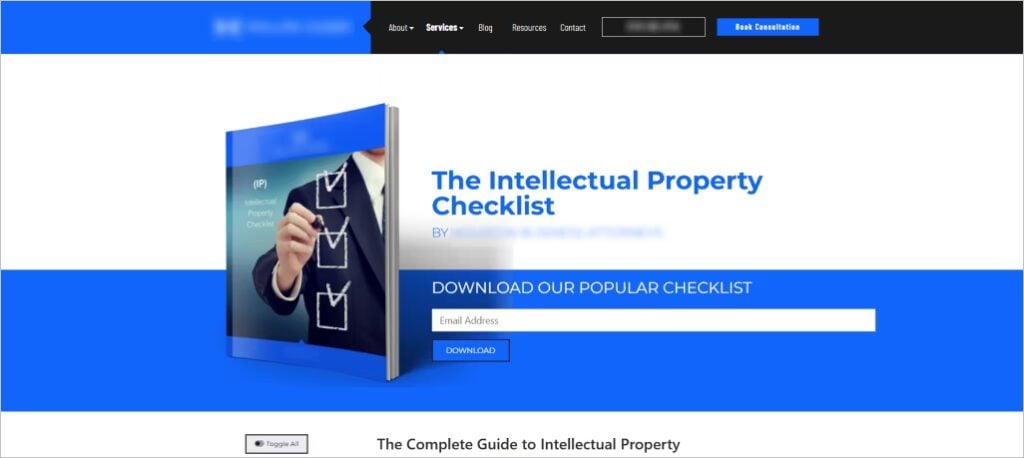
Showcase Real Case Studies
Demonstrating your impact through anonymized case studies builds tremendous credibility:
- Challenge: “Tech startup faced patent infringement from industry giant”
- Solution: “Strategic response combining legal defense and licensing negotiation”
- Result: “Favorable settlement allowing continued innovation and market access”
Include specific details about the industries, technologies, and outcomes while respecting client confidentiality.
Quality content isn’t just about SEO — it’s about establishing your firm as the definitive source of IP knowledge in your niche, making you the natural choice when legal services are needed.
3. Design and Launch a High-Performing Professional Website
Your lawyer website isn’t just a digital brochure — it’s often the first impression potential clients have of your IP practice. For technology-focused clients especially, an outdated or poorly functioning site immediately undermines your credibility.
Create a Client-Focused User Experience
Your IP law firm website should be designed around the needs and questions of potential clients, not your firm’s organizational structure:
- Organize navigation by client problems and IP service areas, not internal departments
- Incorporate intuitive pathways for different visitor types (inventors, business owners, creative professionals)
- Feature prominent calls-to-action tailored to IP client needs (“Schedule a Patent Consultation,” “Get Trademark Protection”)
- Include an IP-specific FAQ section addressing common questions
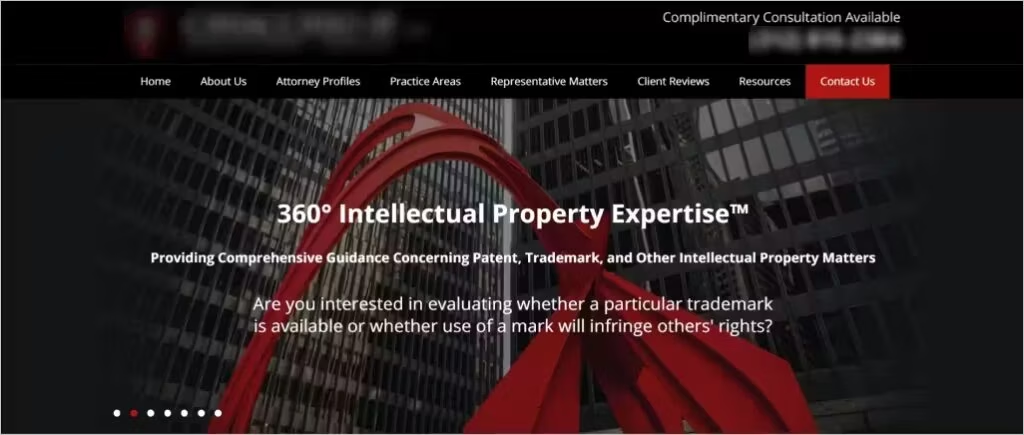
Studies show websites with clear, user-focused navigation see conversion rates up to 18% higher, making this a critical investment.
Optimize for Mobile and Speed
Over 60% of legal service searches now happen on mobile devices, and Google prioritizes mobile-friendly sites in rankings. Ensure your site:
- Loads in under 3 seconds (each second of delay reduces conversions by 7%)
- Is fully responsive on all device types
- Features touch-friendly navigation and forms
- Has easily tappable phone numbers for immediate contact
Use tools like Google’s PageSpeed Insights and Mobile-Friendly Test to identify and fix any issues that could hurt performance or user experience.
Showcase Your IP Expertise and Results
Your website must quickly establish your credibility in intellectual property law:
- Feature attorney profiles highlighting specialized IP qualifications, publications, and speaking engagements
- Include case studies of successful IP matters (anonymized as needed)
- Display testimonials from satisfied clients in various IP areas
- Showcase recognition from IP-specific organizations and publications
- Present your track record (number of patents filed, trademarks registered, successful litigation outcomes)
Remember that potential clients are evaluating whether you have the specific expertise to handle their unique intellectual property matters — generic credentials won’t suffice.
Implement Strategic Conversion Elements
Your website should be designed with law firm conversion rate optimization in mind, actively transforming visitors into valuable leads:
- Place contact forms strategically throughout IP-focused content
- Implement a live chat option for immediate engagement
- Offer IP-specific lead magnets (guides, checklists) in exchange for contact information
- Create targeted landing pages for specific client types or IP services
- Include clear “next steps” information on every page
AI Enhancement Tip: Consider implementing an IP-focused chatbot that can answer basic questions about patent filings, trademark searches, or copyright registrations during off-hours, then seamlessly schedule consultations with the appropriate specialized attorney.
Remember, your website isn’t just about aesthetics — it’s about creating a digital experience that gives potential clients confidence in your ability to protect their most valuable intellectual assets.
4. Implement Strategic Search Engine Optimization (SEO)
For IP and patent law firms, visibility in search engines isn’t optional — it’s essential for connecting with clients actively searching for your expertise. Effective law firm SEO requires a methodical approach tailored to intellectual property law.
Master Keyword Research for IP Law

Effective keyword research for lawyers starts by identifying the terms your potential clients search for:
- Practice-specific terms: “patent attorney,” “trademark registration lawyer,” “copyright infringement attorney”
- Problem-based phrases: “how to protect software invention,” “trademark infringement defense,” “copyright for digital content”
- Industry-specific queries: “biotech patent lawyer,” “entertainment IP attorney,” “tech startup trademark protection”
- Location-based searches: “patent lawyer in [city],” “IP attorney near me”
Use tools like Google Keyword Planner, Semrush, or Ahrefs to identify search volume and competition levels.
Pro Tip: Don’t ignore long-tail keywords like “how to respond to a cease and desist letter for trademark infringement” — these highly specific queries often indicate serious intent and immediate need.
Optimize Your Core IP Service Pages
Each service page should be strategically optimized:
- Title tags: “Patent Attorney in [City] | Software & Technology Patents”
- Meta descriptions: “Protect your innovations with our experienced patent attorneys. Specializing in tech, software, and startups. Free consultation.”
- Headers: Use clear H1, H2, and H3 tags that include primary and secondary keywords
- URL structure: Use descriptive URLs like “/patent-attorney-chicago” rather than generic page numbers
- Internal linking: Connect related content (e.g., link your patent litigation page to your patent prosecution page)
Build IP-Relevant Backlinks
For IP lawyers, successful link building for lawyers hinges on prioritizing quality backlinks, as they are still the most impactful way to improve online visibility. One link from a respected patent office or a trusted industry publication can do more for your rankings than dozens of generic directory listings.
The real value lies in building meaningful connections: contributing guest articles to niche publications in tech or creative fields, getting mentioned by university IP departments, collaborating with startup incubators, or being featured in a client’s press release after a successful case. These aren’t just backlinks—they’re signals of authority, trust, and relevance.
Build Topic Clusters Around Core IP Areas
Organize your content in a hub-and-spoke model:
- Core service page (e.g., “Patent Services”)
- Supporting content linked to the core page:
- “Patent Application Process Explained”
- “How to Conduct an Effective Prior Art Search”
- “Understanding Patent Maintenance Fees”
- “International Patent Protection Strategies”
This structure signals topical authority to search engines while providing comprehensive resources for potential clients.
Optimize for Local and Voice Search
Many IP searches have local intent, and voice search is growing rapidly:
- Claim and optimize your Google Business Profile with IP-specific categories and services
- Ensure consistent NAP (Name, Address, Phone) information across all web properties
- Incorporate natural language phrases into your content (e.g., “How do I register a trademark for my small business?”)
- Create FAQ pages that directly answer common voice search queries
SEO for intellectual property lawyers isn’t just about search engine rankings — it’s about ensuring your expertise is visible exactly when and where potential clients are searching for it.
5. Execute Targeted Pay-Per-Click (PPC) Campaigns
While organic search cultivates long-term visibility, a well-crafted law firm PPC campaign delivers immediate exposure for high-intent intellectual property searches. For IP attorneys, a focused strategy is crucial to maximizing ROI.
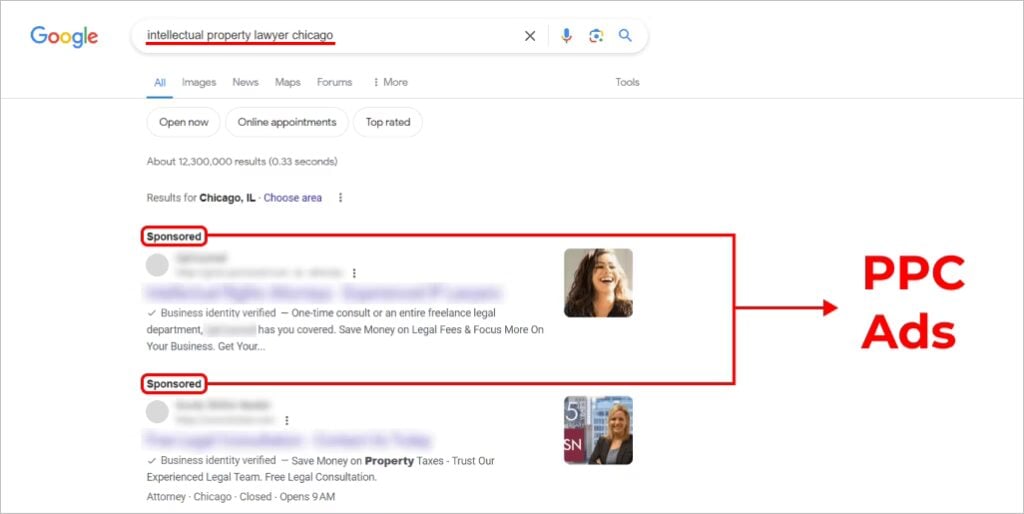
Focus on High-Intent IP Keywords
Not all searches are created equal. Prioritize terms that indicate immediate need:
- “Patent attorney near me”
- “Trademark infringement lawyer consultation”
- “Copyright dispute attorney [city]”
- “How much does a patent lawyer cost”
- “Emergency IP protection services”
These searches often indicate a pressing issue requiring immediate legal assistance.
Segment Campaigns by IP Service and Industry
Create separate campaigns for different practice areas and client segments:
- Patent services: Prosecution, litigation, portfolio management
- Trademark services: Registration, monitoring, enforcement
- Copyright services: Registration, infringement, licensing
- Industries: Technology, entertainment, manufacturing, retail
This segmentation allows for tailored messaging and budget allocation based on your highest-value services.
Create Dedicated Landing Pages for Each Campaign
Generic service pages often fall flat with PPC traffic. To truly drive conversions, you need dedicated landing pages that speak directly to what your prospects are searching for. Tailor the message to match their intent, showcase your expertise, build trust with relevant testimonials, and guide them toward action with a strong call to action—all while keeping distractions to a minimum.
Craft Compelling Ad Copy That Addresses IP Pain Points
Effective PPC ads speak directly to client concerns:
- Highlight specific expertise: “Tech Patent Attorneys With Engineering Backgrounds”
- Address urgency: “Trademark Infringement? Get Legal Protection Today”
- Offer value: “Free Patent Consultation for Startups”
- Include differentiators: “Flat-Fee Copyright Registration Services”
Use ad extensions to showcase client reviews, office locations, and direct contact options.
Implement Smart Bidding Strategies
Take advantage of Google’s AI-driven bidding to make your paid advertising smarter and more effective. With Target CPA, you can focus on getting quality consultation requests, while Enhanced CPC helps you reach the people who really matter to your firm. Use dayparting to concentrate your budget during your busiest hours, and pinpoint your local service area with geographic targeting. This way, you’re not just spending money—you’re investing it where it counts most.
Track and Measure Beyond Clicks
Look beyond basic metrics to evaluate true ROI:
- Conversion tracking for consultation requests
- Call tracking to attribute phone inquiries to specific campaigns
- Client acquisition cost by campaign and keyword
- Lifetime value of clients acquired through different channels
PPC can be particularly effective for newer IP practices looking to establish visibility or established firms launching new service areas. When properly targeted, these campaigns deliver immediate visibility to potential clients actively seeking your services.
6. Grow Your Presence with Social Media Marketing
Social media marketing for lawyers extends beyond posting updates; it’s a dynamic platform to showcase your expertise, engage in key industry conversations, and enhance your professional brand.
Choose Platforms Strategically
Not all social platforms are equally valuable for IP attorneys:
- LinkedIn: Essential for B2B connections, thought leadership, and professional networking
- X (Twitter): Valuable for commenting on current IP developments and connecting with journalists
- YouTube: Excellent for educational content explaining complex IP concepts
- Instagram/Facebook: Primarily for firm culture and community engagement
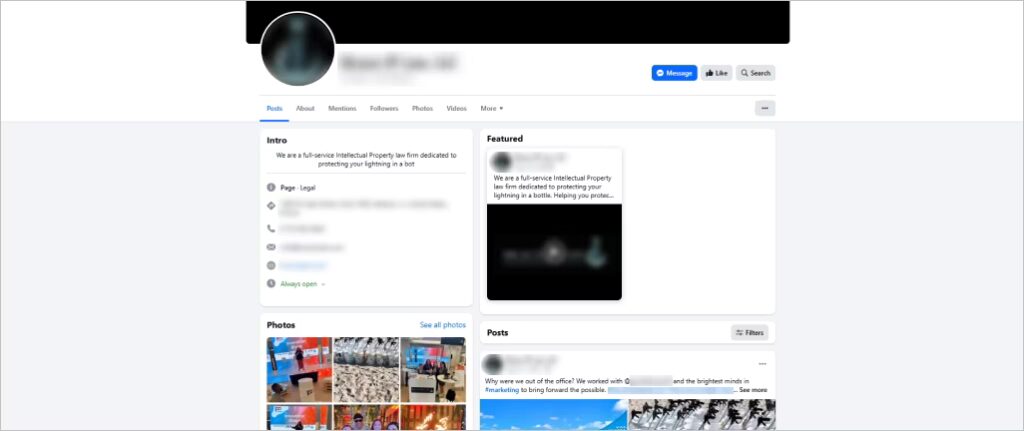
Focus your efforts where your ideal clients and referral sources spend their time rather than trying to maintain a presence everywhere.
Develop a Content Strategy for Each Platform
Tailor your approach to each platform’s unique environment:
- LinkedIn: Publish in-depth articles on IP trends, share case studies, participate in industry groups
- X (Twitter): Comment on breaking IP news, share quick tips, engage with industry hashtags
- YouTube: Create explainer videos, webinar recordings, client testimonials
- Instagram/Facebook: Share team highlights, event photos, community involvement
Repurpose core content across platforms while adapting the format and tone to each audience.
Build Authentic Connections, Not Just Followers
Get involved where it matters most—jump into the conversations happening in industry groups where your potential clients are already active. Take the time to thoughtfully answer questions about IP, showing you really understand their challenges.
Keep your finger on the pulse by sharing and engaging with exciting news and ideas coming from innovation hubs and R&D centers. And don’t forget to celebrate your clients’ successes by sharing their stories and case studies—nothing builds trust and connection like real results and authentic wins. It’s all about being present, helpful, and genuinely connected.
Leverage Content Repurposing for Efficiency
Get the most out of every piece of content you create. Take those in-depth blog posts and break them down into a series of engaging social media updates that keep your audience coming back for more. Turn your webinars into bite-sized video clips that fit perfectly on any platform and grab attention instantly.
Use your client Q&As to craft shareable graphics and quick tips that add real value. And don’t forget your newsletters—transform them into thoughtful LinkedIn articles that start conversations and build connections. It’s all about working smarter, not harder, and making your content go further than ever before.
Advanced Strategy: Consider developing a social listening program that monitors mentions of IP issues in your target industries. This allows you to proactively engage in conversations where your expertise is relevant.
For intellectual property lawyers, effective social media marketing isn’t about posting frequently — it’s about consistently demonstrating specialized knowledge that makes potential clients think, “This is exactly the attorney who understands our innovation challenges.”
7. Run Personalized and Effective Email Marketing Campaigns
Email remains one of the most direct and effective channels for nurturing relationships with potential and existing IP clients. For intellectual property lawyers, personalized email campaigns keep your expertise top-of-mind throughout the often lengthy decision-making process.
Build a Segmented Email List
Not all contacts have the same interests or needs. Segment your list by:
- IP service area interest (patents, trademarks, copyrights, trade secrets)
- Industry (tech, healthcare, entertainment, manufacturing)
- Client status (prospect, current client, former client)
- Content preferences (technical updates, case studies, events)
- Engagement level (active, occasional, dormant)
This segmentation enables truly relevant communication rather than generic newsletters.
Create a Welcome Sequence for New Subscribers
First impressions do matter. That’s why your welcome sequence should do more than just say “thanks for subscribing.” It’s your chance to introduce your firm’s IP expertise in a way that feels personal and valuable.
Share something useful right away—like a handy guide they can download—and let them know what to expect from future emails. Most importantly, invite them to take the next step, whether that’s booking a consultation or joining a webinar. When done right, this thoughtful approach turns casual subscribers into engaged clients much more effectively than a typical newsletter ever could.
Develop Content Sequences for Different IP Topics
Create specialized email series addressing specific intellectual property concerns:
- “5 Steps to Patent Protection” series
- “Trademark Registration Essentials” sequence
- “Copyright Protection in the Digital Age” emails
- “IP Strategy for Growing Businesses” progression
These targeted sequences deliver substantial value while naturally positioning your firm as the logical choice for implementation.
Share Updates and Insights Consistently
Maintain a strong connection with your clients by delivering timely, relevant updates crafted with precision legal copywriting that highlights your professionalism. Whether it’s breaking down important IP cases, explaining new laws that could impact their business, or spotlighting trends in their industry, these insights build trust and keep your expertise front and center.
Don’t forget to share exciting news from your firm, like welcoming new team members or expanding services, and invite them to join webinars or events that add real value. The key is to keep it consistent: pick a rhythm that feels natural, whether it’s weekly, biweekly, or monthly, so you stay memorable without overwhelming their inbox.
Optimize for Engagement and Conversion
Want your emails to truly connect and get results? Start with subject lines that grab attention and clearly show the benefit inside. Make your content easy to skim—think clear headings and short paragraphs that work beautifully on any screen, especially mobile.
Don’t just say someone’s name; make it personal by speaking directly to their industry or interests. And always include strong, specific calls-to-action that guide your reader on what to do next. The secret? Keep experimenting and watch your open rates, clicks, and responses closely—then tweak your approach to make every email better than the last.
Automate Without Losing the Personal Touch
Balance efficiency with authenticity:
- Use automation for consistent delivery and sequences
- Personalize based on subscriber data and behavior
- Include direct response options (reply to this email, call this number)
- Ensure attorneys personally respond to direct inquiries
- Send one-to-one emails for high-value opportunities
For intellectual property lawyers, email marketing creates a direct channel to demonstrate continued expertise and build relationships with potential clients throughout their often lengthy decision-making process.
8. Manage and Enhance Your Online Reputation
For intellectual property lawyers, your reputation is undeniably your greatest asset. In today’s digital landscape, that reputation is largely influenced by online reviews, ratings, and public perception. Effective attorney reputation management guarantees that prospective clients encounter a true and positive reflection of your expertise and service excellence.
Monitor Your Digital Presence Proactively
You can’t manage what you don’t measure. Implement systematic monitoring:
- Set up Google Alerts for your firm name and key attorneys
- Regularly review legal directories (Avvo, Martindale-Hubbell, FindLaw)
- Monitor social media mentions and tags
- Track reviews across Google, Yelp, and industry platforms
- Analyze client feedback from satisfaction surveys
This vigilance allows you to address issues quickly and amplify positive mentions.
Cultivate Positive Reviews from Satisfied Clients
Reviews on attorney review sites play a crucial role in shaping hiring decisions for IP lawyers:
- Create a systematic process for requesting reviews after successful matters
- Make it easy by providing direct links to your preferred platforms
- Focus on clients who have expressed satisfaction with your services
- Consider timing requests when clients are most appreciative
- Follow up professionally on review commitments
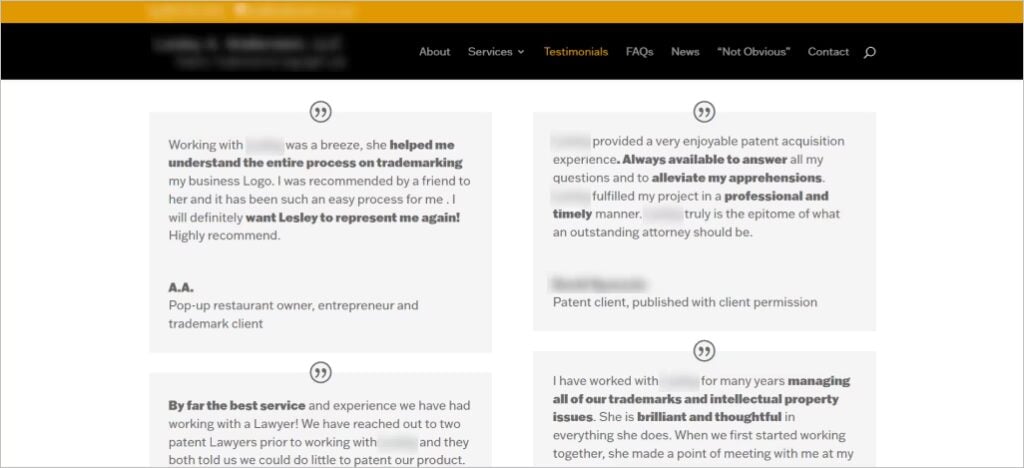
Aim for quality over quantity — detailed, specific reviews from recognizable names carry more weight than generic praise.
Respond Thoughtfully to All Reviews
The way you respond to feedback says a lot about who you are as a professional. Always take a moment to thank those who leave positive reviews—it’s a great way to remind people of the value you bring. When criticism comes your way, don’t rush to defend yourself; instead, listen carefully and respond thoughtfully.
Genuine feedback is a gift, an opportunity to learn and improve. If a situation needs a deeper conversation, it’s okay to take it offline to keep things personal and respectful. And above all, never forget the importance of maintaining confidentiality in everything you say. After all, your response often gets more attention than the review itself—so make it count.
Build Credibility Through Third-Party Validation
If you want to truly stand out and build a reputation that lasts, focus on the things that really make a difference. Go after awards that recognize your hard work and expertise, speak at events where your insights can inspire others, and share your knowledge by publishing in respected legal and industry outlets.
Stay active in professional communities, and be ready to offer your perspective when the media needs an expert on IP matters. These authentic efforts don’t just boost your profile — they create meaningful connections and build trust, helping you become a respected voice in your field.
Address Potential Issues Proactively
No firm is perfect. When issues arise:
- Acknowledge legitimate concerns directly
- Explain steps taken to resolve the matter
- Implement and communicate process improvements
- Follow up to ensure satisfaction
- Learn from the experience to prevent recurrence
For intellectual property attorneys, reputation management isn’t just about damage control — it’s about consistently demonstrating the expertise, professionalism, and client care that form the foundation of a successful practice.
Conclusion: Building Your IP Law Firm’s Digital Future
Your knowledge of intellectual property law is priceless, but it only truly matters when the right people can find you. With more businesses relying on search engines to discover legal services, a strong digital marketing strategy is no longer optional—it’s essential. Without it, even the most qualified IP lawyers risk getting buried beneath competitors who’ve invested in their online visibility.
At Comrade Digital Marketing, we specialize in helping intellectual property law firms break through the noise and stand out where it counts—on Google, across social media, and in front of high-intent clients. We combine legal industry knowledge with data-driven marketing strategies to attract the kind of clients who value and need your specialized expertise.
Whether you’re looking to grow your client base, improve lead quality, or become the go-to authority in IP law, we’re here to help you get there. Contact us today to start building a digital presence that truly reflects the value you bring to the table.
